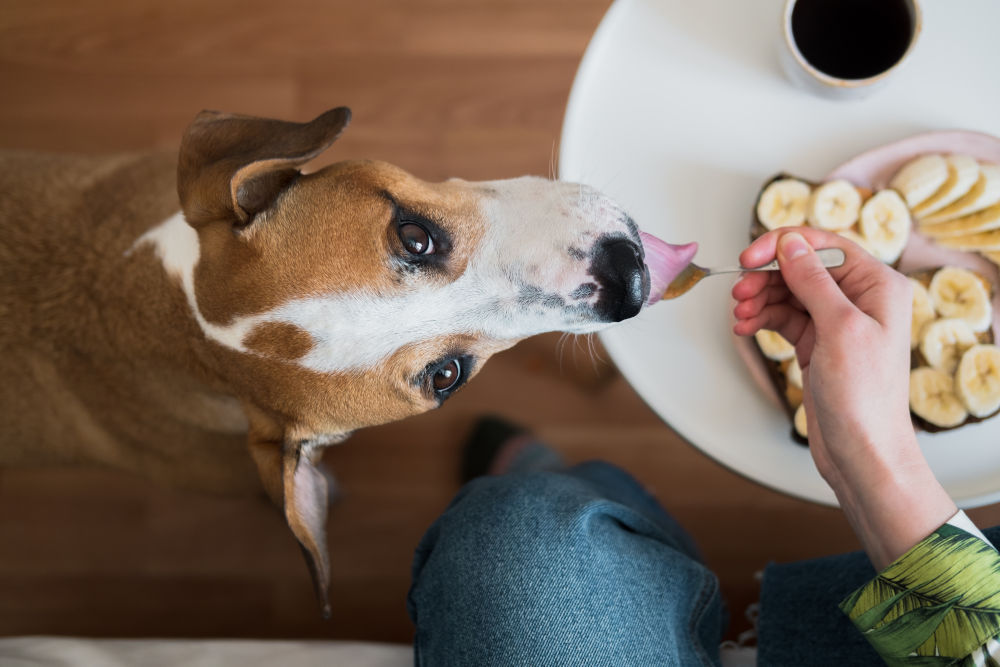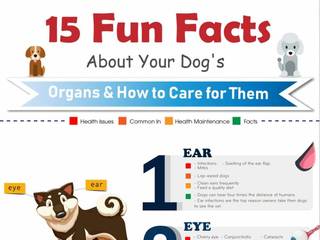As a dog owner, it can be tempting to share your food with your furry friend. However, not all human foods are safe for dogs to consume. Some can be toxic and even deadly. Fortunately, there are some human foods that dogs can safely enjoy. In this article, we will explore ten human foods that dogs can eat without harming their health. From fruits and vegetables to proteins and grains, you'll learn which foods you can share with your four-legged companion and how they can benefit from them.
Peanut Butter

Dogs can eat peanut butter in moderation, but it is important to choose a natural, unsweetened peanut butter that does not contain xylitol, a sugar substitute that is toxic to dogs. Peanut butter can be a good source of protein and healthy fats for dogs, but it is also high in calories, so it should only be given as an occasional treat and in small amounts.
It is a popular treat for dogs because it is high in protein, healthy fats, and other nutrients like vitamin E, niacin, and magnesium. That being said, some dogs may be allergic to peanuts, so monitoring your dog's reaction after giving them peanut butter for the first time is important.
Additionally, if your dog has a history of pancreatitis, you should avoid giving them peanut butter as it is high in fat and could trigger an episode. However, not all types of peanut butter are suitable for dogs. Some peanut butter brands contain added sugars, salt, and preservatives, which can be harmful to dogs in large amounts.
Moreover, some peanut butter brands contain xylitol, a sugar substitute that is safe for humans but toxic to dogs. Xylitol can cause a rapid insulin release, leading to hypoglycemia (low blood sugar), seizures, liver failure, and even death in severe cases.
Therefore, when choosing peanut butter for your dog, it is essential to read the label and look for natural, unsweetened peanut butter that does not contain xylitol or other harmful additives. If you choose the right type of peanut butter and give it in moderation, it can be a tasty and nutritious treat for your furry friend.
You can add a small amount of peanut butter to your dog's regular food to make it more palatable and nutritious. Mix a tablespoon of peanut butter with a little warm water to create a sauce-like consistency, and drizzle it over your dog's kibble. This is also a great way to introduce new foods to picky eaters.
Peanut butter can be a tasty and healthy treat for your dog, especially when used as a training reward. You can offer a small amount of peanut butter on a spoon or smear it inside a Kong toy for your dog to lick and chew.
Plain cooked vegetables

Feeding your dog cooked plain vegetables can be a healthy addition to their diet, as long as it's done in moderation and the right way. Vegetables are a good source of vitamins, minerals, and fiber, which can help improve your dog's overall health.
However, it's important to note that dogs are primarily carnivores and require a diet that's high in protein. Vegetables should never be the main source of nutrition for your dog and should only make up a small portion of their diet. Feeding your dog cooked, plain vegetables can be a healthy addition to their diet, as long as it's done in moderation and the right way.
Some examples of vegetables that can be good for dogs to eat include carrots, green beans, sweet potatoes, peas, and broccoli. These vegetables are a good source of vitamins, minerals, and fiber, which can help improve your dog's overall health.
When feeding your dog vegetables, it's important to avoid certain types that may be harmful to them, such as onions, garlic, and avocados. These foods can cause toxicity and may lead to health problems.
There are several ways to incorporate vegetables into your dog's diet. One option is to mix cooked, plain vegetables with your dog's regular food. This is a good way to introduce new vegetables while ensuring that your dog still gets their regular nutrition. Another option is to use small pieces of cooked vegetables as a healthy treat. If your dog enjoys the taste of vegetables, this can be a good option for providing a low-calorie snack.
Using cooked vegetables as a food topper for your dog's regular food is also an option, which can add some extra nutrition and flavor to their meal. It's important to start with small amounts of vegetables and to gradually increase the portion size to avoid any digestive upset. Additionally, it's a good idea to introduce new foods gradually and in small amounts to avoid any digestive upset.
Cooked lean meats without the bone
Feeding your dog cooked, lean meats without bone can provide various benefits for their overall health. Firstly, lean meats are an excellent source of protein, which is essential for building and repairing your dog's muscles, tissues, and organs. Additionally, meats contain important nutrients such as iron, zinc, and B vitamins that contribute to your dog's overall well-being. Cooked meats are generally more easily digestible than raw meats, making them a great addition to your dog's diet.
Dogs also love the taste of meat, which can be particularly helpful for picky eaters. However, it's important to be cautious with the types of meats you feed your dog, as some can be high in fat and cholesterol, which can lead to health problems if consumed in excess.
Adding lean meats to your dog's diet is a great way to increase their protein intake. When choosing lean meats for your dog, it's important to choose meats that are low in fat, as too much fat can lead to weight gain and other health problems.
Good options for lean meats include chicken breast, turkey breast, lean cuts of beef, and lean cuts of pork. Lean ground beef or turkey can be a really good source of protein for dogs, but be sure to choose a low-fat option and cook it thoroughly to avoid any bacterial contamination. Chicken breast is a great source of protein and can be cooked plain. Avoid giving your dog fatty meats like bacon or sausage, as these can be high in fat and salt, which can be harmful to your dog's health.
Additionally, bones can pose a choking hazard and cause other health issues, such as intestinal blockages or dental problems. It is generally not recommended to give dogs cooked bones, as they can pose a choking hazard and cause other health issues such as intestinal blockages or dental problems.
Cooked bones can splinter and break, causing sharp pieces that can injure your dog's mouth, throat, or digestive tract. Additionally, cooked bones can become brittle and easily break, which can result in your dog swallowing sharp fragments that can cause internal injuries.
Eggs

Eggs are a great source of nutrition for humans and animals alike. They are a complete protein, meaning that they contain all the essential amino acids that the body needs to function properly. Eggs are also rich in vitamins and minerals, such as vitamin D, vitamin B12, selenium, and choline. These nutrients are important for supporting a dog's immune system, promoting healthy bones and teeth, and maintaining healthy brain and nerve function.
When it comes to dogs, eggs can be a healthy addition to their diet in moderation. Eggs are a good source of protein for dogs, which is important for their muscle development and overall health. Feeding eggs to dogs in moderation can also provide some health benefits. For example, the fatty acids found in eggs can help to promote healthy skin and a shiny coat. Additionally, eggs may help to support a dog's digestive health and can even help to alleviate certain digestive issues.
However, it is important to note that eggs should be fed to dogs in moderation and as part of a balanced diet. Too many eggs can lead to an upset stomach, obesity, and other health problems. It is best to feed dogs plain, cooked eggs without any added seasoning.
However, if you feel the need to add some flavor to the eggs, a small amount of plain, unsalted butter or olive oil can be used sparingly. It is important to avoid adding any seasonings, spices, or salt to the eggs when feeding them to your dog.
Additionally, it is important to ensure the eggs are cooked before feeding them to your dog. Raw eggs can contain harmful bacteria such as salmonella, which can make your dog sick. But as long as they are fully cooked, eggs are a great occasional treat for dogs.
Carrots (cooked or uncooked)
Dogs can indeed eat carrots, and they are a great addition to a healthy and nutritious diet for dogs. Not only are they low in calories, but they are also high in fiber, beta-carotene, and other essential vitamins and minerals.
Moreover, the crunchiness of carrots can help promote healthy teeth and gums in dogs by removing plaque and tartar buildup. However, it is important to give carrots to dogs in moderation, as overfeeding them can cause digestive issues.
It is recommended to wash and chop the carrots into bite-sized pieces to avoid choking hazards. Carrots are an excellent source of beta-carotene, which is converted to Vitamin A in a dog's body, and Vitamin A plays an important role in maintaining healthy skin, vision, and coat. Additionally, carrots contain other vitamins and minerals, such as potassium, calcium, and Vitamin K, which can support overall health and well-being in dogs.
Steaming, boiling, or microwaving carrots are all safe ways to cook them for your dog. Even chopped raw carrots can be a great treat for training. Especially as a low-calorie treat option! As with any new food, it is important to introduce carrots slowly into your dog's diet and monitor them for any signs of an allergic reaction or digestive upset. And of course, don't give your dog any carrots that have been cooked in sauces or spices. When giving dogs any kind of human food, plain is always best!
Salmon
Salmon can be a healthy addition to your dog's diet in moderation and as part of a balanced and complete diet. In addition to being a good source of protein, healthy fats, and omega-3 fatty acids, salmon also contains vitamin B12, vitamin D, and selenium, which are important for your dog's overall health.
When feeding your dog salmon, it's best to avoid giving them smoked or cured salmon, as these products can contain high levels of salt and other preservatives that can be harmful to dogs. Instead, consider cooking a small filet of salmon in the oven with just a bit of olive oil.
Once cooked, remember to remove any bones from the salmon before feeding it to your dog, as the bones can pose a choking hazard or cause digestive issues. Once the salmon is cooled, you can add some chunks of pieces of salmon to their food as a delicious topper.
Additionally, many dogs can benefit from salmon oil. Salmon oil is a great supplement for dogs, as it is a rich source of omega-3 fatty acids, which can help support your dog's skin and coat health, reduce inflammation, and promote heart and brain health.
Salmon oil is often sold in liquid form, and you can add it to your dog's food as a supplement. Be sure to follow the manufacturer's instructions for dosage and storage. When choosing a salmon oil supplement for your dog, look for one that is made from wild-caught salmon and free of additives or preservatives. It's also a good idea to choose a product that is tested for purity and potency.
Pumpkin
Dogs can eat pumpkin as it can be a healthy addition to their diet when fed in moderation. Pumpkin is a good source of fiber, vitamins A and C, potassium, and iron.
In fact, many veterinarians recommend pumpkin as a dietary supplement for dogs because it can help regulate digestion and promote healthy bowel movements. Additionally, pumpkin can be useful for dogs with diarrhea or constipation because of its high fiber content.
However, it's important to note that dogs should not consume pumpkin that contains added sugars or spices, as these can be harmful to their health. Plain, canned, or cooked pumpkin is best for dogs. Instead, only feed your dog plain, cooked pumpkin, whether from a can or fresh.
Again, if from a can, make sure there are no additional ingredients like sugars or spices. You can also make your own homemade pumpkin dog treats using pumpkin puree, oatmeal, and other healthy ingredients. There are many recipes available online that are easy to make and can be a fun activity for you and your dog.
One of the easiest ways to give your dog pumpkin is to mix it in with their regular food. Simply scoop out a tablespoon or two of canned or cooked pumpkin and mix it into your dog's meal. You can also add a bit of water or low-sodium broth to help mix it in.
Dog-safe fruit
While not all fruits are safe for dogs to eat, there are still quite a few that can be delicious nutritional treats for dogs. For example, dogs can eat certain fruits like apples, watermelon, and cantaloupe in moderation. These fruits are generally safe for dogs and can provide nutritional benefits.
Apples, for example, are a good source of fiber, vitamins A and C, and antioxidants. Just make sure to remove the seeds and core before giving them to your dog, as these parts can be harmful.
Watermelon and cantaloupe are also safe for dogs, as long as you remove the seeds and rind. These fruits are high in vitamins A and C, as well as potassium and fiber. Fruits are generally low in calories, making them a healthy alternative to traditional dog treats. This can be especially beneficial for overweight dogs or those prone to weight gain.
Additionally, the act of chewing on crunchy fruits like apples can help clean your dog's teeth and promote healthy gums. Many fruits, including apples and cantaloupe, are high in vitamin C and antioxidants, which can help boost your dog's immune system and protect against disease. Fruits like apples and watermelon are high in fiber, which can help regulate your dog's digestion and prevent constipation.
Remember to stay away from toxic fruits. Fruits can be a healthy addition to your dog's diet, but it's important to remember that not all fruits are safe for dogs to eat. Some fruits, such as grapes, raisins, and cherries, can be toxic to dogs and cause serious health problems.
It's important to research any new fruits before feeding them to your pet and remove any potentially harmful parts before serving. When introducing fruits to your dog's diet, start with small amounts and monitor their reactions to ensure they don't have any adverse effects.
Plain white rice
Dogs can have rice as part of their diet. In fact, rice is a common ingredient in many commercial dog foods and can also be used as a bland, easily digestible food to help settle a dog's stomach if they have an upset stomach or diarrhea.
Rice is a good source of carbohydrates, which can provide energy for dogs. When feeding rice to dogs, it's important to cook it thoroughly and serve it plain, without any added salt, spices, or seasonings, as these can be harmful to dogs.
Many times, vets will prescribe plain white rice to be used as a bland food. For example, if your dog has an upset stomach, diarrhea, or vomiting, plain cooked rice can be a helpful food to offer. Its bland nature can help soothe their digestive system and provide a gentle source of nutrition. Some vets will suggest a diet of plain white rice combined with plain cooked chicken breast for a few days to help dogs who are suffering from digestive issues.
The plain nature of just two simple ingredients helps dogs still get their daily caloric needs met but also reduces the risk of further aggravating their sensitive tummies. Of course, this is not a balanced diet and should only be done for a few days and per a vet's directions.
Cooked or canned sweet potatoes
Dogs can eat sweet potatoes. Sweet potatoes are actually a really nutritious and healthy food option for dogs, as they are high in fiber, vitamins, and minerals. They are also a good source of complex carbohydrates, which can provide sustained energy for your dog. Feeding sweet potatoes to your dog can have several benefits. Sweet potatoes are a nutritious food that are high in fiber, vitamins A and C, and several minerals. These nutrients can help support your dog's overall health and well-being, as well as regulate their digestion and promote healthy bowel movements.
Sweet potatoes are also a source of complex carbohydrates, which can provide sustained energy for your dog throughout the day. Additionally, sweet potatoes contain antioxidants that may help reduce inflammation in your dog's body. They are also a low-fat food, which makes them a good option for dogs that need to maintain a healthy weight or are prone to pancreatitis.
There are several ways to feed sweet potatoes to your dog. You can cook them by boiling or baking them until they are soft and then cut them into small pieces to mix in with your dog's regular food. Alternatively, you can make sweet potato chews by slicing them into thin strips and baking them in the oven until they are dehydrated. You can also buy canned sweet potatoes, but be sure to choose unsweetened ones without added sugars or other unhealthy ingredients.

Conclusion
It's important to remember that dogs have different nutritional needs than humans, and not all human foods are safe for them to consume. However, there are several human foods that are not only safe but also healthy for dogs, like lean meats, certain vegetables, and even certain fruits.
Incorporating these foods into your dog's diet can provide them with added nutrition and variety. Always make sure to introduce new foods gradually and in moderation, and if you have any concerns or questions, consult with your veterinarian. By being mindful of what foods you share with your furry friend, you can ensure that they stay happy and healthy for years to come.






